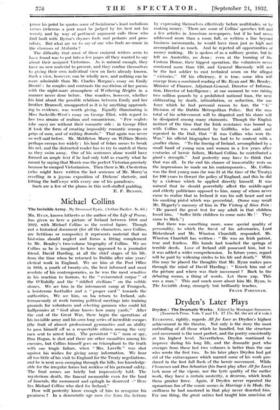Michael Collins
The Invisible Army. By Desmond Ryan. (Arthur Barker. 8s. Gd.) MR. RYAN, known hitherto as the author of the Life of Pearse, has given us here a picture of Ireland between 1916 and 1922, with Michael Collins as the central figure. Though not a historical document (for all the characters, save Collins, are fictitious or composite) it represents material that no historian should neglect and forms a fitting complement to Mr. Beasley's two-volume biography of Collins. We sec Collins as he is imagined to have appeared to a journalist friend, David Harding, at all the chief stages of his life, from the time when he returned to Dublin after nine years' clerical work in England. We see him at the Post Office in 1916, a youth of twenty-six, the best informed and most resolute of his contemporaries, as he was the most sensitive in his reaction to horrors, to the " eviscerated corpse " of the O'Rahilly and the " riddled civilians " on the cobble stones. We see him in the internment camp at Frongoch, a boisterous footballer and a " proper card " towards the authorities. We. w see him, on his return to Ireland, sub- terraneously at work turning political meetings into training grounds for volunteers and selecting gunmen who. could hit halfpennies at " God alone knows how many yards." After the end of the Great War, there begin the operations of his invisible army and his own long series of incredible escapes' (the fruit of almost professional gymnastics and an ability- to pass himself off as a respectable citizen among the very men sent to arrest him). The persistent " G " man or spy, Dan Hogan, is shot and there are other casualties among his enemies, but Collins himself goes on triumphant to the truth with one tragic failure, when " Mrs. Lavelle " was shot against his wishes for giving away information. We hear` all too little of his visit to England for the Treaty negotiations, and he is next seen sweeping through the hills, too knowledge- able for the irregular forces but reckless of his personal safety. The final scenes are briefly but impressively told. The mysterious death, the funeral memorable even for the land of funerals, the monument and epitaph he deserved —" Here lies Michael Collins who died for Ireland."
How will posterity know enough of him to recognize his greatness ? In a democratic age men rise from the bottom by expressing themselves effectively before. multitudes, or by making money. There are some of Collins' speeches left and a few articles in American newspapers, but if he had never addressed more than a room full, or written a line beyond business memoranda, he would have risen just as high and accomplished as much. And he rejected all opportunities of money making. He is spoken of as a military genius, but he left no Austerlitz, no Jena ; even at the burning of the Custom House, their biggest operation, the volunteers never mustered more than 120, and • General Macready will not be the last soldier to cast technical scorn on the alleged victories." Of his efficiency, it is true,- some idea will emerge from a combined reading of Mr. Ryan and Mr. Beasley. Minister of Finance, Adjutant-General, Director of Informa- tion, Director of Intelligence ; at- one moment he -was raising two million pounds by a prohibited national - loan, the next obliterating by death, intimidation, or seduction, the one force which he had personal reason to fear, the " G " Division of the Dublin Metropolitan Police. But the sum total of his achievement will be disputed and his share will be dissipated among many claimants. Though the English instinct of the time that the Irish resistance was bound up with Collins was confirmed by Griffiths, who said, and repeated in the Dail, that " It was Collins who won the War," his official biographer has had to be content with a smaller claim. "To the freeing of Ireland, accomplished by a small band of young men and women in a few years after centuries of heroic failure, Michael Collins, he contributed a giant's strength." And posterity may have to -think that that was all. In the end his chance of immortality rests on the hnpressions he made on his contemporaries. Mr. Collins was the first young man (he was 31 at the time of the Treaty) for 100 years to thwart the policy of England, and this he did- by a violence which he applied directly himself. It was natural that he should powerfully affect the middle-aged and elderly politicians opposed to him, many of whom never came to realize that in Ireland it was his soft heart and not his smoking pistol which was proverbial.- (Some may recall Mr. Hegarty's memory of him in The Victory of Sinn Fein : " He passed the great test for any adult in that children loved him. ' Suffer little children to come unto Me ! ' They Came to Mick.") But there was something more, some special quality of personality, to which the finest of his adversaries, Lord Birkenhead and Mr. Winston Churchill, responded. Mr. Winston Churchill has written : " He was. an Irish patriot, true and fearless. His -hands had touched the springs of terrible deeds. Love of Ireland still possessed him, but to it was added a Wider comprehension. In future years, regard will be paid by widening circles to his life and death." With this may be placed the thoughts that Mr. Ryan makes pass through the mind of David Harding : " Knock him out of the picture and where was their movement ? Back to the debating rooms; a thing of words. Let them yap. This was a man." This and much more about him Mr. Ryan, in The Invisible Army, strangely but brilliantly teaches.
FRANK PARENTIAM.






























 Previous page
Previous page